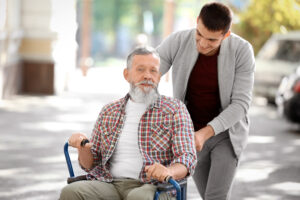By Codi Darnell
June 28, 2022
“Dignity is as essential to human life as water, food, and oxygen.”
– Laura Hillenbrand
 I was 28 years old the first time a care-aid showered me. Just days after surgery, newly paralyzed, and unfamiliar with my own body, it was the first time in my adult life I needed someone to help me bathe. And even though it was strange and surreal, the embarrassment in that moment was minimal because the woman who wheeled me to the shower room (the woman I sat fully exposed in front of as she washed my most intimate places) treated me as an equal. She talked to me about my children, she let me do whatever I was able to do, and she asked permission before touching me in any way. She spoke easily, listened carefully, and showed me what it meant to physically care for someone without demeaning them.
I was 28 years old the first time a care-aid showered me. Just days after surgery, newly paralyzed, and unfamiliar with my own body, it was the first time in my adult life I needed someone to help me bathe. And even though it was strange and surreal, the embarrassment in that moment was minimal because the woman who wheeled me to the shower room (the woman I sat fully exposed in front of as she washed my most intimate places) treated me as an equal. She talked to me about my children, she let me do whatever I was able to do, and she asked permission before touching me in any way. She spoke easily, listened carefully, and showed me what it meant to physically care for someone without demeaning them.
One of the most common fears people have about aging is the loss of independence. Our society has cultivated a belief that being able to do it on your own and take care of yourself is of the utmost importance. So much so that when a time comes that an individual needs assistance, it feels like failure.
 Aside from aging, injury or disease can come knocking on your door at any stage of life and result in a need for care. And whether it is required for the remainder of one’s life or it is short-term following a medical procedure or during an illness, individuals who are faced with this loss of independence often feel a loss of humanness. But independence does not dictate how human someone is – dignity does.
Aside from aging, injury or disease can come knocking on your door at any stage of life and result in a need for care. And whether it is required for the remainder of one’s life or it is short-term following a medical procedure or during an illness, individuals who are faced with this loss of independence often feel a loss of humanness. But independence does not dictate how human someone is – dignity does.
Nobody wants to rely on others for their basic needs. No vision board is boasting photos that depict assistance in dressing, bathing, using the bathroom, or getting in and out of bed. The truth is that losing the ability to physically care for yourself is a devastating departure from independent living and it takes time to get used to. But, like the first care-aid who helped me shower, there are ways to soften this transition and ways that make it easier to receive care without feeling inadequate.
Whether an individual receives care from a loved one or a professional, it should always be done with the understanding that it isn’t just about a body, but about a person. See the man, the woman, the entrepreneur, the artist, the parent, the athlete, the teacher, the gardener. This distinction is the difference between the individual feeling like an object or feeling like a human.
 Ideally, the relationship between a person and their caregiver is a relationship of trust. Trust built on communication, reliability, and mutual respect. However, finding this type of care is a luxury. Cost and staffing shortages plague people who require care, often meaning they will take whatever they can get. In many cases, loved ones take on the role of caregiver. According to Statistics Canada, in 2018 an estimated 7.8 million Canadians were providing care for a family member or friend. While it is wonderful these people can step in and help, does it not instead show a large gap in the caregiving system?
Ideally, the relationship between a person and their caregiver is a relationship of trust. Trust built on communication, reliability, and mutual respect. However, finding this type of care is a luxury. Cost and staffing shortages plague people who require care, often meaning they will take whatever they can get. In many cases, loved ones take on the role of caregiver. According to Statistics Canada, in 2018 an estimated 7.8 million Canadians were providing care for a family member or friend. While it is wonderful these people can step in and help, does it not instead show a large gap in the caregiving system?
I will leave you with this. If you, the reader, have never been in a situation where you’ve required care, I want you to ask yourself something. If you needed someone to help you with the most personal tasks, what would you expect from them in order to feel comfortable, in control, safe? What would you expect from them in order to feel like your humanity was not only being acknowledged, but respected?
Now, how do we make sure all people who need assistance have access to the kind of dignified care that keeps their humanness intact?
For information on NervGen Pharma Corp., a clinical stage biotech company dedicated to creating innovative solutions for the treatment of nervous system damage, please follow us at www.nervgen.com.
